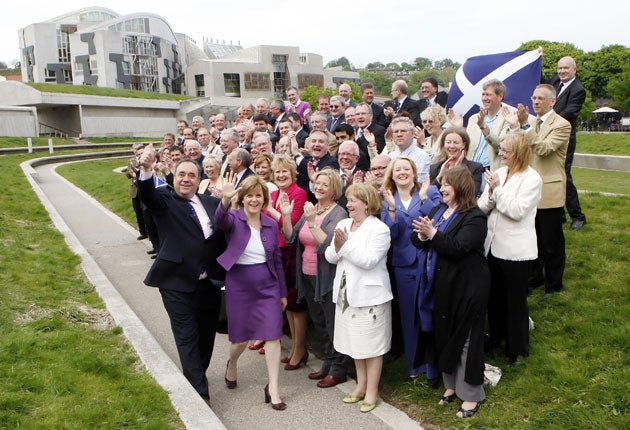Cameron offers major concessions to Salmond
SNP leader gets new economic powers and is told that Westminster will not place obstacles in way of referendum

Alex Salmond has won his first concession from David Cameron after his party's historic election victory on Thursday, with a pledge that Scotland can begin borrowing hundreds of millions of pounds to fund public projects in future years.
The Government has acceded to the Scottish National Party leader's demands for immediate authority to borrow at least £300m annually from the Treasury to help boost Scotland's economic recovery. Mr Salmond had been demanding the change – in the face of resistance from Westminster – during the passage of the Scotland Bill, which will devolve a number of economic powers from London to Edinburgh.
Michael Moore, the Secretary of State for Scotland, has also confirmed that Westminster will not use its own legal powers to block a referendum on Scottish independence.
The concessions suggest that the coalition is anxious not to antagonise the emboldened First Minister in charge of a majority administration. The leaders of Scottish Labour and the Liberal Democrats have announced their resignations after their parties were swamped by the SNP tide on Thursday.
Labour's leader Iain Gray announced he would stand down from the job in the autumn, while his Lib Dem counterpart, Tavish Scott – who presided over the loss of 12 out of 17 seats – yesterday confirmed he was quitting immediately.
Mr Salmond, having added 23 to the tally of MSPs and finished with a four-seat majority, greeted his victory with a grand speech in Edinburgh, where he held out an olive branch to rivals, saying he looked forward to their "constructive opposition".
But he pledged that, in a later telephone call with Mr Cameron, he would be "laying down markers as to what this result, this mandate, means in terms of Scotland's relationship with the UK". Mr Salmond revealed yesterday that he had "laid out the grounds whereby there's going to have to be economic teeth inserted into that Scotland legislation because we need recovery in Scotland".
While an independence referendum is unlikely to happen for at least two years, the Scotland Bill has emerged as the first arena for conflict between Holyrood and Westminster.
Mr Moore, who will meet Mr Salmond to discuss the Bill tomorrow, said he was preparing to make announcements about funding arrangements, "particularly around the timing of borrowing powers". He added: "That is an area I am looking forward to showing some good progress."
However, it was clear that the Government will have to make more compromises if it wants to maintain cordial relations. The new SNP administration is demanding further concessions, including the right to set corporation tax on business. Amid growing demands for the Government to call the Nationalists' bluff and sanction an immediate referendum, Mr Moore yesterday confirmed that he would not attempt to block a vote on Scotland's future.
Opponents claim Mr Salmond is delaying the referendum because, despite his party's level of support, the majority of the Scottish electorate remains opposed to independence. The former Scottish Labour apparatchik John McTernan said: "The strategy is to normalise independence and build up support for it over what would effectively be a five-year referendum campaign. Picking a fight over the Scotland Bill is part of that: if he extracts concessions, he wins, and even if he doesn't, he wins by being seen fighting Scotland's corner at Westminster."
The process towards independence is a long and complicated one that would involve at least two referendums, and still the Government would ultimately have the final say on Scotland's future. One Tory former Scotland secretary, Lord Forsyth, said the coalition should seize control of the issue before Mr Salmond can build up support for independence. He told The Scotsman: "We need to give people a choice, and I would like to think that preserving the United Kingdom is top of the Prime Minister's priorities. Once that issue is settled, we can then address the life-threatening issues facing our public services and businesses, debate on which was singularly absent from the Scottish election campaign."
Murdo Fraser, Scottish Conservatives' deputy leader, said: "If we're going to have a referendum, we should have it as soon as possible so we can get the question settled once and for all."
But Mr Moore made it clear that Westminster had no appetite for an early showdown. He said: "We will not be putting any difficulties in the way of the referendum taking place and we will work with the Scottish government to ensure that they can have it when they choose."
The procedure: Five steps to independence
1. A Bill is passed by the Scottish Parliament authorising a referendum.
2. The referendum asks the people of Scotland to approve the executive entering into negotiations with the British government over the future of the nation.
3. If the referendum is passed, the two administrations discuss terms of independence – covering issues including the division of assets and debt, the future of North Sea oil and Scotland's membership of international bodies.
4. Legislation for a second referendum, which, technically, can be authorised only by Westminster.
5. The final referendum asks the Scottish people if they want independence on the negotiated terms.
Source: Constitution Unit, University College London
Join our commenting forum
Join thought-provoking conversations, follow other Independent readers and see their replies
Comments